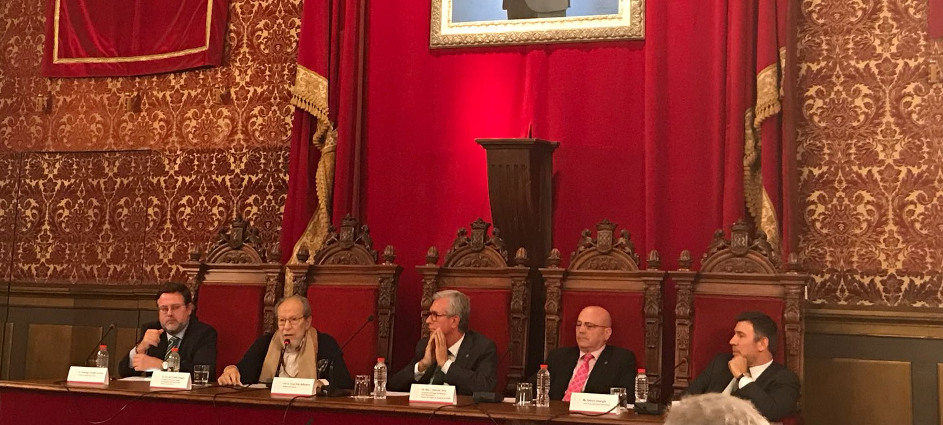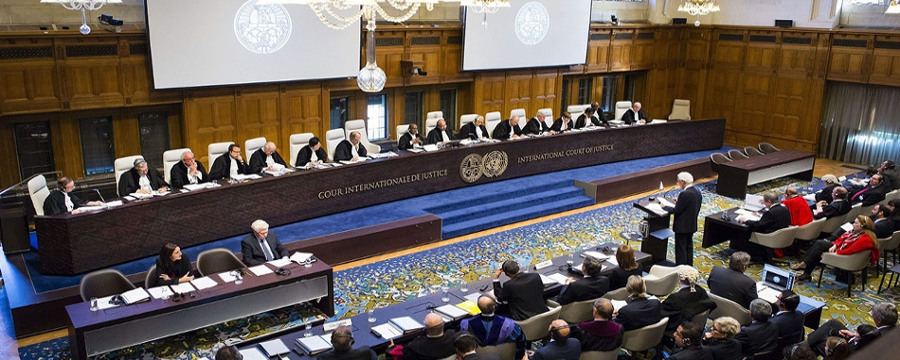Santiago Castellà, full academician of the Royal European Academy of Doctors-Barcelona 1914 (RAED), professor of Public Constitutional Law at the University Rovira i Virgili (URV) and academic director of the Lawyers Association of the International Criminal Court (BPI-ICB), directed the Permanent Seminary Luis del Castillo on International Criminal Justice, which was held between the past 28 November and 1 December in Tarragona, organised by the BPI-ICB and the URV. The sessions were devoted to preparing the contents of a future master’s degree in International Justice focused on the activity of the International Criminal Court, based in The Hague.
The Seminar began with an inaugural lecture given by Fabricio Guariglia, chief of the Prosecutor’s Office of the International Criminal Court. The event took place in the plenary hall of the Tarragona City Council under the presidency of the mayor, Josep Fèlix Balallesteros, and served to recognise the long career dedicated to international justice of Luis del Castillo, honorary president of the Lawyers Association of the International Criminal Courts and dean emeritus of the Barcelona Lawyers Association (ICAB), which gives his name to the seminar.
 The meeting brought together, among other experts, Blas Imbroda, president of the BPI-ICB, professor of Criminal Law at the University of Granada and dean of the Melilla Lawyers Association; Erika Torregrossa, general secretary of the BPI-ICB and deputy of the ICAB; Ken Gallant, professor of International Criminal Law at Harvard University and the University of Pennsylvania; Esteban Peralta, head of the section of support of the parties of the Secretariat of the International Criminal Court; Pierre Alexandre Kopp, professor at the Panthéon-Sorbonne University of Paris; Daniel Rezene Mekonnen, President of the Eritrean Lawyers Association in Exile; Dignité Bwiza, professor at the Witwatersrand University of Johannesburg; Jaume Antich, lawyer of the BPI-ICB; Svetlana Paramonova, professor of Criminal Law at the Free University of Brussels, and Luis Ojeda, researcher of the European Group on Governance of the University of Luxembourg.
The meeting brought together, among other experts, Blas Imbroda, president of the BPI-ICB, professor of Criminal Law at the University of Granada and dean of the Melilla Lawyers Association; Erika Torregrossa, general secretary of the BPI-ICB and deputy of the ICAB; Ken Gallant, professor of International Criminal Law at Harvard University and the University of Pennsylvania; Esteban Peralta, head of the section of support of the parties of the Secretariat of the International Criminal Court; Pierre Alexandre Kopp, professor at the Panthéon-Sorbonne University of Paris; Daniel Rezene Mekonnen, President of the Eritrean Lawyers Association in Exile; Dignité Bwiza, professor at the Witwatersrand University of Johannesburg; Jaume Antich, lawyer of the BPI-ICB; Svetlana Paramonova, professor of Criminal Law at the Free University of Brussels, and Luis Ojeda, researcher of the European Group on Governance of the University of Luxembourg.




